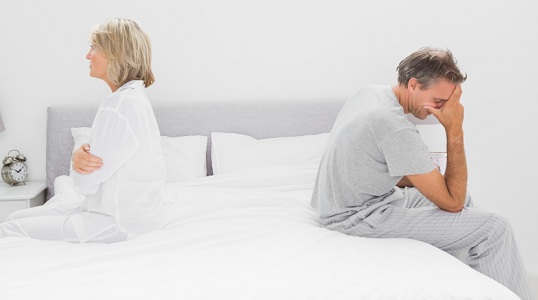


Thyroid disease comes with many concerning symptoms, but often the most worrisome is the loss of sex drive or decreased libido. In order to have a healthy libido, it's important to have a healthy thyroid. There are studies indicating that even a small reduction in thyroid levels can dramatically lower a woman's libido in addition to causing weight gain, fatigue and depression.

Hypothyroidism often shows itself gradually. Its symptoms can go unnoticed because they are similar to the signs of aging. Hypothyroidism can reduce metabolism, thus slows down the functioning of reproductive organs. It can also affect the adrenal glands which can reduce the production of the sex hormones. Men and women can see a decrease in testosterone and estrogen levels, leading to a lower sex drive. Luckily, a thyroid imbalance can be corrected and thus you can treat the problems related to thyroid and sex drive as well as other bodily functions.
As your metabolism gets slower, you could see more obvious signs, such as:
Consider the following options if you discover you have thyroid and sex drive trouble.
Hormone and endocrine imbalances can be common in thyroid patients. Make sure that your doctor checks your hormones such as progesterone, estrogen, and testosterone. You can receive hormone as an injection or a patch. And in some cases, pellets under the skin may be suggested. Women can also benefit from testosterone. Doctors often prescribe it in pill or cream form. Finally, make sure your adrenal function is checked as well, specifically, your DHEA and cortisol.
Medical treatments may include taking a levothyroxine/T4 drug such as Synthroid. Some will need a synthetic form of the hormone T3, such as Cytomel. Another possibility would be a more natural drug such as Nature-thyroid or Armour.
Some supplements that you can consider are:
Although there is a strong link between thyroid and sex drive, low libido can be caused by other problems, such as:
The first thing you need to look at is if you are happy with your relationship. Are there doubts, fights or troubles that could be affecting your loss of libido? Have you been together for a long time? It may be time to shake things up to see a change in your libido. Relationship trouble can be one of the first reasons you see a loss of libido.
Feeling anxious or having too much stress can impact your libido. If you have been feeling exhausted or stressed out, you may need to deal with these problems first.
Depression is a serious mental illness that can affect all areas of your life. The symptoms include the loss of interest in sex life. If you feel hopeless, too tired to complete daily tasks, or see changes in your sleep patterns, speak to your doctor about depression.
If you are overindulging in alcohol, you may see a loss of libido. Be moderate with your drinking and limit yourself to 1 drink per day if you are a woman and up to 2 drinks per day if you are a man.
Getting older can affect your metabolism as well as your libido. Your metabolism will decrease and this can affect hormones, in particular testosterone.
There are women who have shown a lowered sex drive when they are using certain hormone based contraception. If you suspect this is the case, speak with your doctor to change the contraception. But some symptoms may resolve on their own after a few months.
There are some health conditions such as diabetes, obesity, and cardiovascular disease that can affect your libido.
There are medications that can cause a loss of libido. Diuretics for high blood pressure and some antidepressants can be the causes. If you are concerned about the medication you take, you should check with your doctor to adjust the dose or change to another medication.